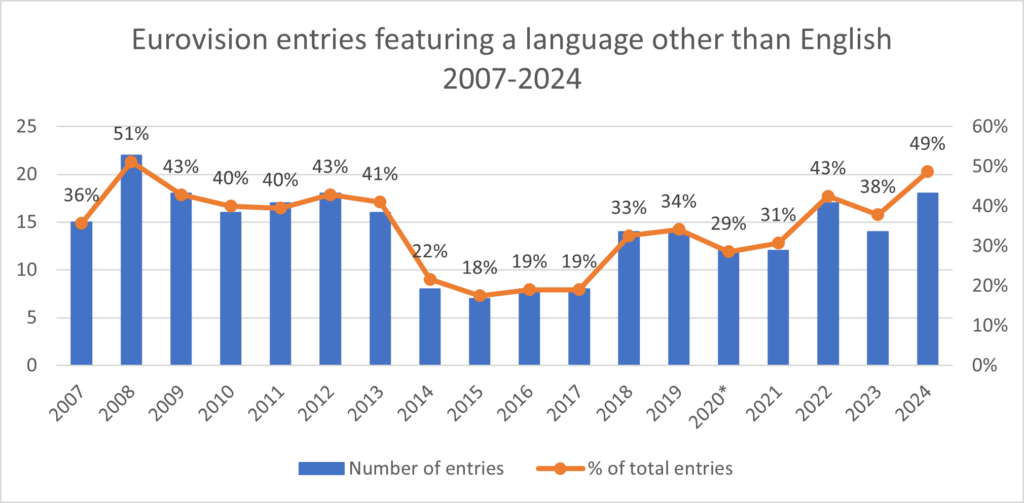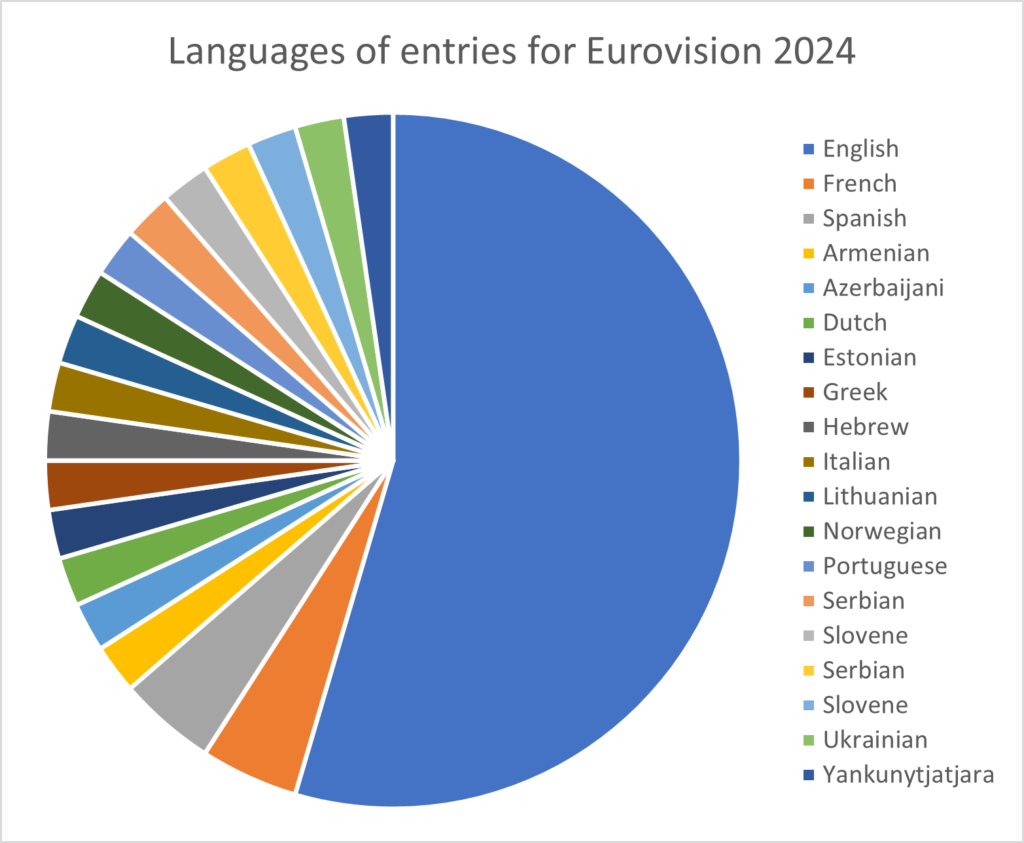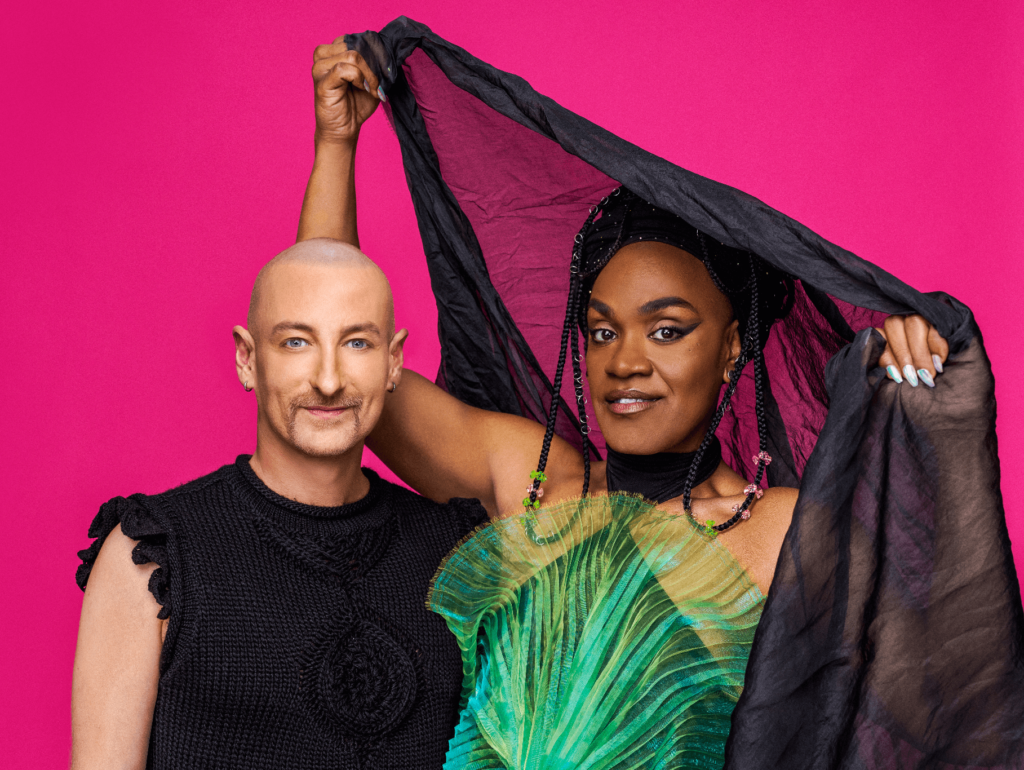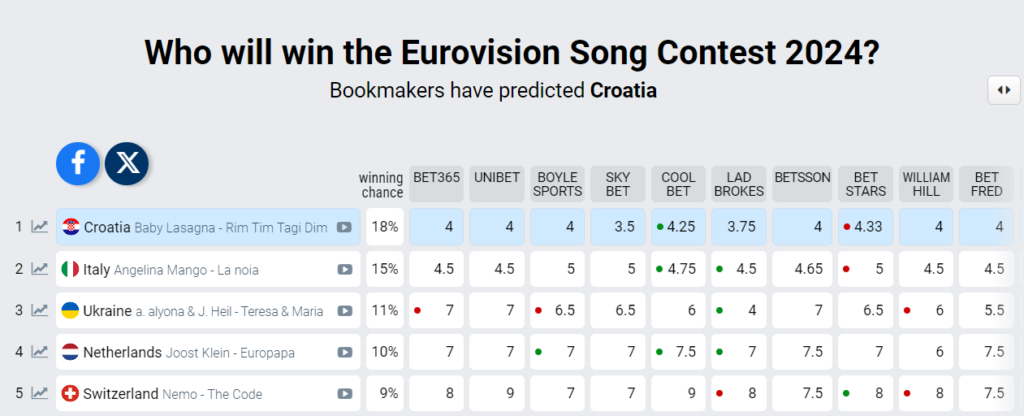
If it’s facts and trivia about national languages in Eurovision 2024 you seek, you’re in the right place. Hard to believe that this is already my fifth edition of this post. But if you’re new here, welcome!
I am a bit of a languages nerd. I studied German and Russian at university (and have now lived in Germany for very nearly 10 years), but I am a much bigger Eurovision nerd. So naturally, one of my favourite things about the contest is the use of national languages at the show – particularly how this fluctuates and changes over time. (See also my in-depth post on the rise of the English language at Eurovision.)
Eurovision has historically been a platform where countries are able to show off their own culture to the whole of Europe, whether that be dance, costume or language. And I’ve always loved the idea of people enjoying (and voting for) songs they cannot understand – like my Dad who voted for Albania in 2018.
So now that all entries for the Eurovision Song Contest 2024 have been released, let’s take a look at how this year is shaping up.
A note on terminology: in this post, I will occasionally use the phrase ‘foreign languages’ to denote non-English languages. This is purely because re-using the phrase ‘songs performed at least partially in a language other than English’ is boring and very awkward. I am aware that French is not a foreign language in French-speaking countries, obviously.
How many entries in Eurovision 2024 feature a national language?
Of the entire 37 songs we will hear on stage in Malmö this year, 18 of them are sung or partially sung in a language other than English. This represents a tantalising 49% of this year’s entries.
Which countries are singing in their own language at Eurovision 2024?
Armenia, Australia, Azerbaijan, Estonia, France, Greece, Israel, Italy, Lithuania, Luxembourg, Netherlands, Norway, Portugal, Serbia, Slovenia, Spain and Ukraine will be entering in their native languages. Additionally, San Marino’s entry this year is performed in Spanish. (Even more additionally, the United Kingdom, Ireland and Malta are all performing in English once again, which is also their national language.)

How does this compare to previous years?
As you can see from the graph above, there’s been an increase in both the number of entries in a foreign language and the overall percentage. In fact, this year is the closest we’ve come since 2008 to having over half of the entries feature a non-English language.
This very much gives me hope, because – as we’ll see below – this year also features several languages we’ve either never or rarely heard in the contest, suggesting that in amongst the data, there is a bit of a resurgence of interest in native language entries. Given the landslide of points that Käärijä’s Finnish-language Cha Cha Cha received in the televote last year, it’s hardly surprising. (What is surprising however, is that Finland is singing in English again this year…)
Read more on last year here: National languages at Eurovision 2023
Which languages are returning to Eurovision in 2024?
As part of this small resurgence, we are welcoming several languages back to the competition after a long hiatus. Firstly, Norwegian will be heard at the competition for the first time in 18 years. Meanwhile, Estonia will be entering in Estonian for the first time in 11 years.
Excitingly, we also have a debut this year. For the first time, Australia will perform in a language other than English, with several parts of their entry sung in the indigenous language of Yankunytjatjara. Similarly, Azerbaijan will sing partially in Azerbaijani for the first time ever, breaking the country’s 16-year streak of English-only entries. (However, Bulgaria was the first country to use Azerbaijani on the Eurovision stage, singing several lines in their multi-lingual 2012 entry, Love Unlimited.)

On the other end of the scale, Lithuanian and Dutch are both back again after just a one-year hiatus.
Additionally, we will hear one line in German in this year’s contest (from the Netherlands, because of course it’s not going to be Germany…) but as this is such a minor part of the song, it isn’t reflected in the stats in this article. A line of German was also sung by Denmark in 2019, but the last time an entry was performed in German was Austria’s Woki mit dem Popo in 2012.
National languages in Eurovision 2024: trivia and trends
Two firsts: Australia and Azerbaijan
As mentioned above, both Australia and Azerbaijan will be breaking their English-only streaks in 2024. Electric Fields will be entering for Australia with an entry that incorporates Zaachariaha Fielding’s aboriginal heritage and features several phrases in Yankunytjatjara. Meanwhile, Azeri singer Fahree will be the first singer representing Azerbaijan to sing in Azerbaijani with his entry Özünlə apar.
Switching to English: Albania and Croatia
On the other hand, Albania and Croatia will both be breaking streaks of their own by switching to English in 2024. This is especially sad, given that the Western Balkans has been a bastion of native language entries over the past few years. Albania performed in Albanian in 2018-2019 and again 2021-2023, but 2024 entrant Besa has switched her entry to English, as was done in 2020. Further up the Adriatic, Baby Lasagna’s infectious Rim Tim Tagi Dim will be the first Croatian entry since 2018 to not feature any lyrics in Croatian, breaking a five-year streak.


The Baltics: the new Balkans?
Interestingly this year, both Estonia and Lithuania are singing in their own languages this year. Latvia is letting the side down; Latvian entry Hollow is a powerful English-language ballad (although in my opinion, the Latvian-language version is much better). I have hope that the Baltic states might show continued interest in showcasing their languages in the years to come – I know that Silvester Belt’s Luktelk has been a huge hit in his native Lithuania for months now.
Luxembourg’s streak continues
If you haven’t heard already, Luxembourg is back! Participating for the first time since 1993, Luxembourg is back after a whopping 31 years. This will be Luxembourg’s first time participating since the national language rule was permanently abolished in 1999, however the former Eurovision powerhouse is continuing tradition by entering a song in French and English. While this will be the first time the country has sung in English, the use of French means it will maintain its status (shared by only a handful of countries) to have always entered in one of its national languages.
Read more on Eurovision: Top tips for attending Eurovision for the first time
Can we expect to see a non-English winning entry in 2024?
Maybe. At the time of writing (30 March 2024), the top 5 favourite countries to win Eurovision 2024 are Croatia, Italy, Ukraine, Netherlands and Switzerland. Of which, Italy, Ukraine and the Netherlands are singing in their national languages while both Croatia and Switzerland are performing in English.

Croatia has been sitting atop the odds for a few weeks now, since Baby Lasagna went from relative obscurity to storming the national final in February. However, Italy has been steadily climbing the odds and the Netherlands’ Joost has broken records in his native Netherlands and entered the top 40 charts in both Belgium and Lithuania. Ukraine, of course, should never be underestimated in the competition.
I think it’s fair to say that this is the most open competition for a number of years, so it’s hard to predict a winner, but I would say there is a healthy chance we might have another non-English winner.


Into the future: will this upswing of national languages at Eurovision continue?
I think there is every reason to be hopeful: Eurovision 2024 has the highest proportion of song containing foreign languages since 2008. But what makes me the most optimistic is, as outlined below, it’s not necessarily just ‘the usual suspects’ making up the numbers this year.
In fact, what I find the most interesting is the cases of the Netherlands and Lithuania. Their performances in Dutch and Lithuanian in 2022 looked to be simple exceptions to their otherwise monolingually-English recent records – and true to form, both countries entered in English in 2023. But now they are both back to Dutch and Lithuanian, with the potential for an exception or a quirk to turn into a broader trend.


Additionally, foreign languages performed well in Eurovision last year. Of course we remember Cha Cha Cha‘s amazing second place, but more interesting perhaps is the success at the semi-finals: we only lost one native-language entry (Romania) to the feared non-qualification, with the nine other qualifiers singing in national languages making it through. Does this suggest an audience appetite for more linguistic diversity? Let’s hope so!
But of course, Eurovision is by its nature unpredictable, which is why we love it. But fingers crossed that whatever happens in Malmö, the show continues to indulge and expand our love of foreign cultures, music and languages.
Do you have any predictions for Eurovision 2024? Comment below.


Hey John, hope you’re great!
I actually just found your blog while searching for things to do in/near Cologne since I’ll be around for 5 days next week (touring with Depeche Mode is fun!) and had to post a comment since Eurovision has been growing on me recently – mind you, I’m originally from Brazil and been living in London for the past 11 years, so Eurovision has been pretty much an uncharted territory for most of my life, just recently been on an almost crash course with one of my friends at work and loving every bit of it!
Cha cha cha has possibly been ingrained in my brain since I first heard it last year 😀 very much cheering for Lithuania and Norway this year!
Hope you have a lovely day and keep on posting! xx
Thanks for your comment, Camila! I work in a team with a lot of people from outside Europe, so I am always happy to hear the contest growing on people 😀 I am also cheering on Lithuania this year!
Dear John,
I am currently writing a book on the disassociation of language from meaning. In a chapter on music I mention Eurovision. I’d love to be able to use your two 2024 pie charts in the chapter (obviously acknowledging your blog as the source). Please let me know if this would be ok to you.
Andrey
Of course, please do!